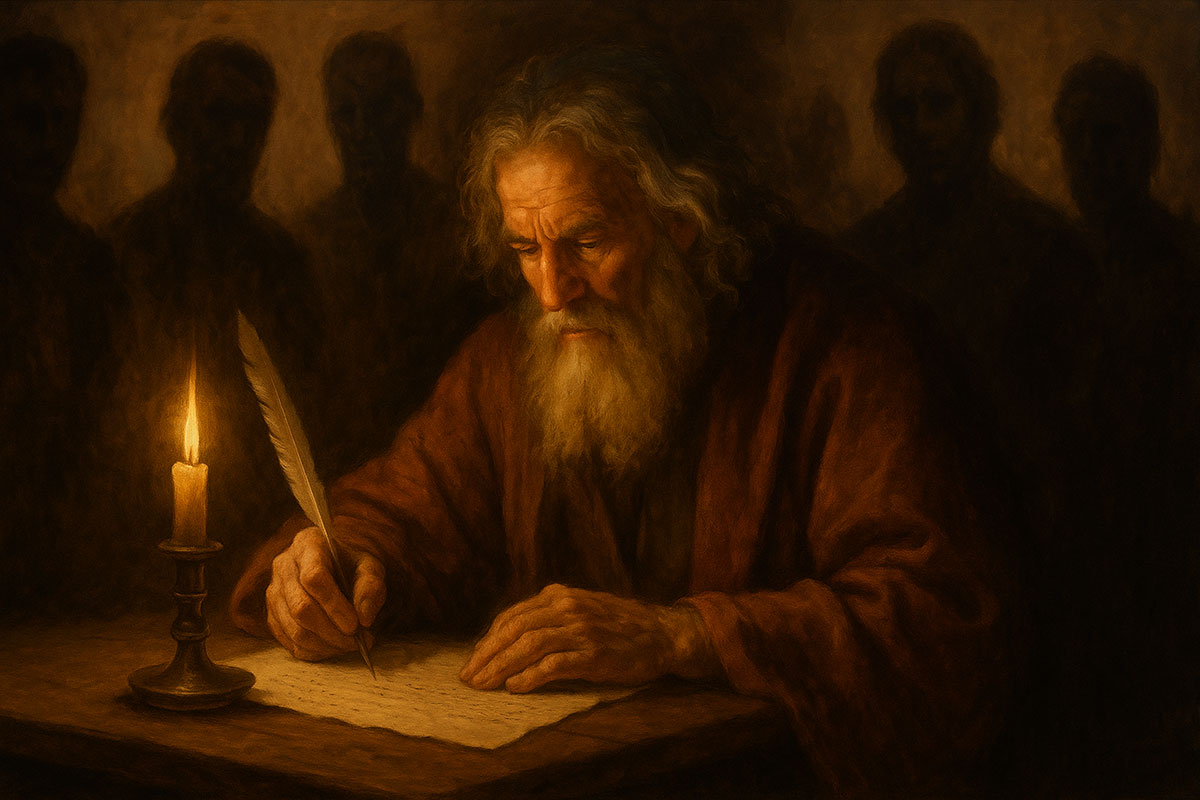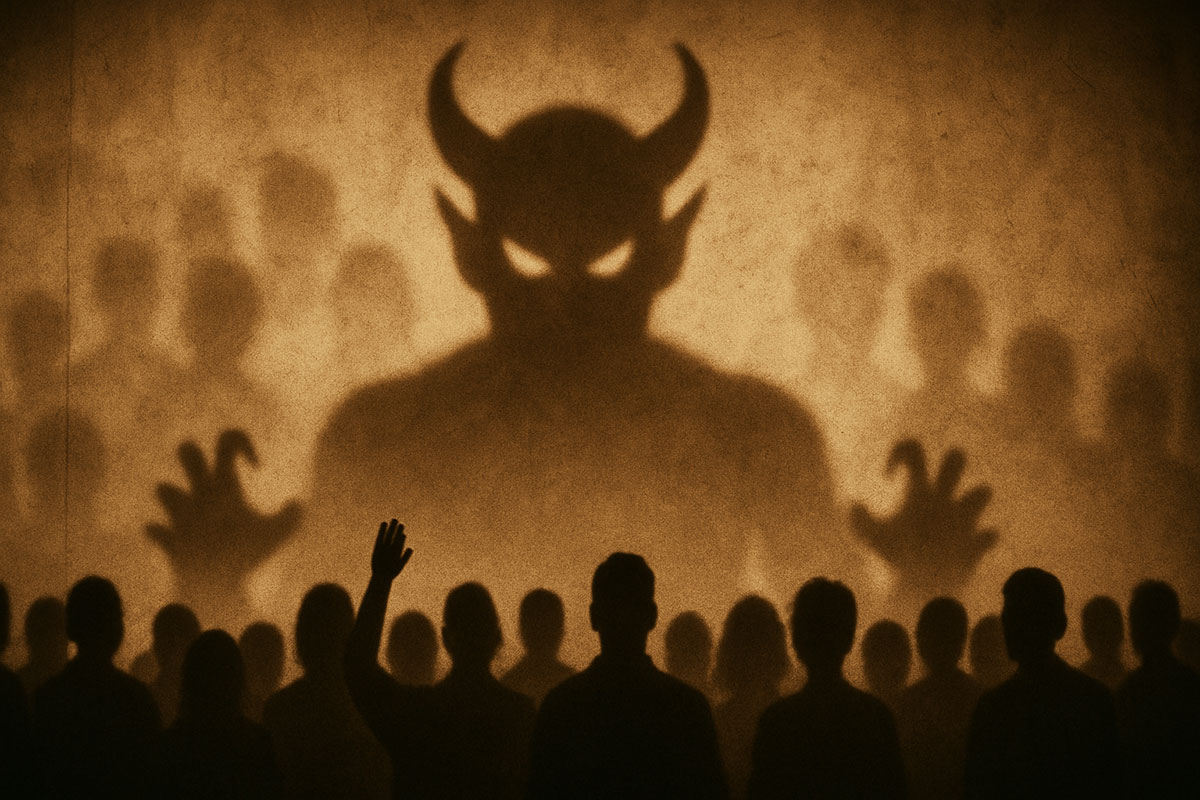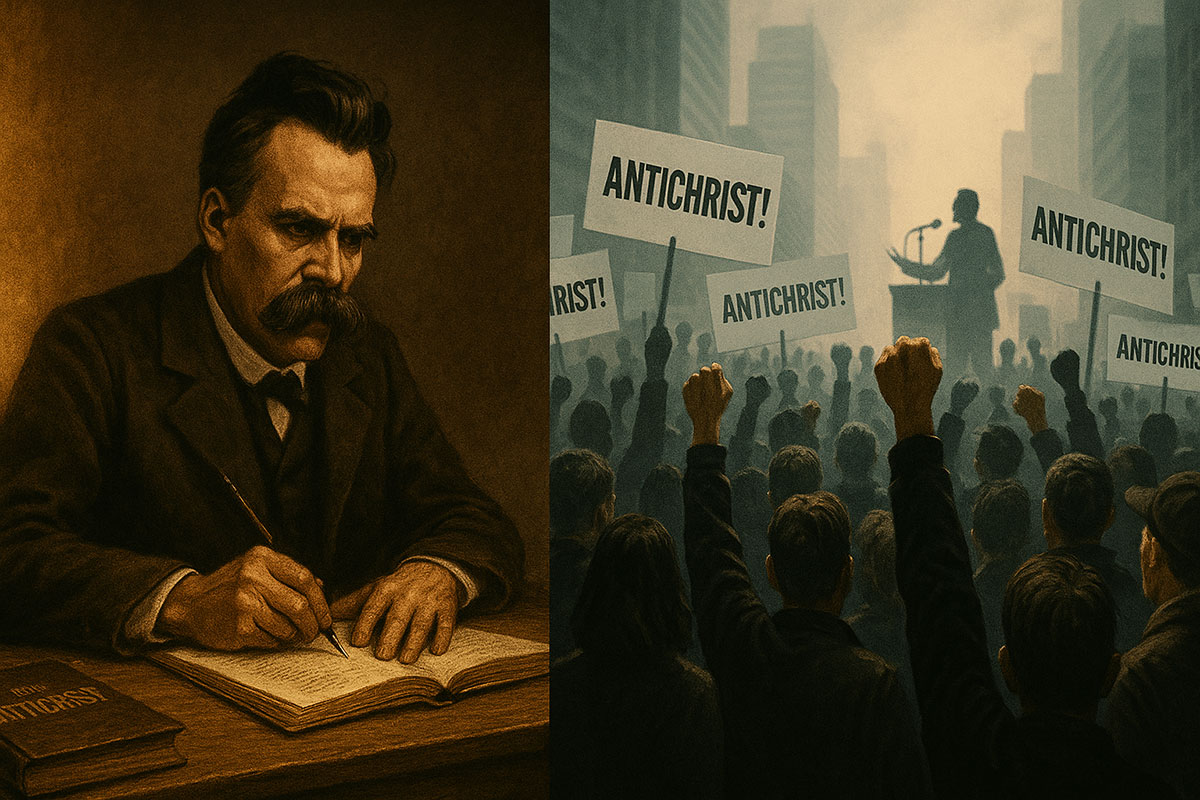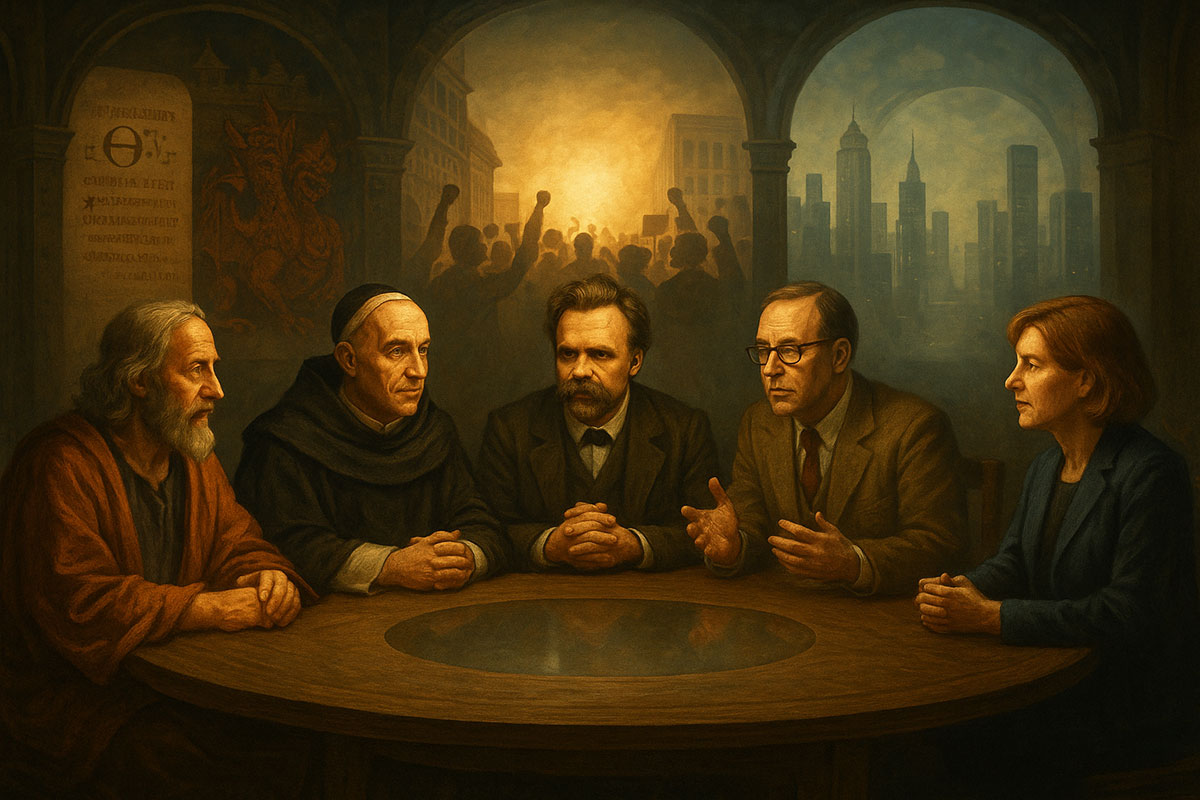
|
Getting your Trinity Audio player ready...
|

Introduction by John the Apostle
Children, you have heard that the antichrist is coming, and indeed many antichrists have already come. When I first wrote those words, I did not speak of a single monstrous figure to frighten future generations. I spoke of a spirit — one that denies Christ’s love, twists truth into deception, and divides the family of God.
Through the centuries, men have turned my warning into story, symbol, and weapon. The Middle Ages painted him as a beast; philosophers seized him as a challenge; politicians fling the word as an insult. But I tell you again: the antichrist is not far away. It is already here, in the pride that blinds, in the hatred that hardens, in the fear that casts out love.
This series is not a hunt for villains but an invitation to vigilance. If you wish to know where the antichrist walks, look first within your own heart. Do you deny love? Do you trade truth for convenience? Do you divide where Christ calls for unity? This is the warning — and the hope. For if the antichrist spirit lives in lovelessness, then Christ’s spirit lives wherever love abides.
(Note: This is an imaginary conversation, a creative exploration of an idea, and not a real speech or event.)
Topic 1: The Early Warnings — What Did John Mean by “Antichrist”?

Karen Armstrong (Moderator, opening)
Friends, welcome. Today, we turn to the very beginnings of the term “antichrist.” The epistles of John warn of many antichrists already present, not simply one apocalyptic villain. I want to start by asking: What was John actually trying to say to his community when he first used this word?
Question 1: What did John mean by “antichrist” in the first-century context?
John the Apostle
When I wrote those letters, I was not speaking of a distant figure to terrify future generations. I was warning my children in the faith about those who denied that Jesus had truly come in the flesh. Some in our midst twisted the truth into shadows of their own making. The “antichrist” was not one person, but anyone whose words or spirit pulled hearts away from Christ’s love and truth.
C.S. Lewis
What strikes me is that John’s warning feels surprisingly modern. Evil is rarely confined to a single villain wearing horns. It seeps in through falsehood, pride, and clever distortions. In my stories, I tried to show that even ordinary choices can echo with that “antichrist spirit.” John wasn’t so much describing a monster, but a mirror in which each of us must examine our loyalties.
Friedrich Nietzsche
And yet, John’s words already betray a certain fear of dissent. To label one’s opponents “antichrist” is to close dialogue. I myself used the term in my book The Antichrist not to point to some supernatural villain, but to unmask Christianity itself as a distortion of life’s natural strength. In John, the seed of suspicion was planted: define the enemy, condemn the outsider. That tendency lives on.
Thomas Aquinas
Nietzsche, you mistake zeal for truth as mere exclusion. John spoke not of silencing but of safeguarding the faithful from deceit. Heresies already abounded — Docetism, Gnosticism. To deny Christ’s incarnation is to deny salvation. Thus, “antichrist” marked not random opponents but those doctrines fundamentally opposed to the heart of the faith.
Karen Armstrong
So we see a spectrum: John offering a pastoral warning, Aquinas defending doctrinal clarity, Lewis pointing inward, and Nietzsche seeing suppression. It raises a deeper question about human nature itself.
Question 2: Why do humans seem so quick to label enemies as “antichrist” rather than wrestle with the spirit within?
C.S. Lewis
Because it is always easier to see evil “out there” than “in here.” Pride blinds us. To accuse another of being “the antichrist” relieves us of examining our own complicity. It is the oldest trick of the Enemy: to make us look elsewhere while he works quietly in our own hearts.
John the Apostle
This is why I said, “many antichrists have already come.” The danger was never only external. The denial of Christ can take root even in those who once walked with us. That is why discernment must begin at home.
Nietzsche
Or perhaps it is the very structure of Christianity that breeds this. To define oneself as “saved” requires an opposite: the “lost.” To claim truth requires the “antichrist” as foil. You speak of inward battles, but your system thrives on drawing these stark contrasts.
Thomas Aquinas
No, Nietzsche. Christianity names enemies not to delight in them but to guard souls. Yet Lewis is correct: sin is closer than we imagine. The devil needs no grand prince when he can whisper pride into every heart. The greatest battle is the smallest — the will’s alignment with God or against Him.
Karen Armstrong
Which suggests that the language of “antichrist” may function both as a mirror for self-examination and as a wall for exclusion. This paradox has haunted Christianity for centuries.
Question 3: If we return to John’s original intent, what lesson should we draw for our time?
John the Apostle
Remember that Christ came in the flesh. Do not reduce Him to myth, nor twist Him into your own desires. The “antichrist” is any spirit that denies His love and truth incarnate. Therefore, let love guide discernment.
Friedrich Nietzsche
I would say: see how dangerous such labels are. “Antichrist” became a tool of power, wielded to crush dissent. Better to abandon the word and live courageously, affirming life itself, rather than hide behind accusations.
C.S. Lewis
But we cannot abandon vigilance. The deeper meaning of John’s words is timeless: evil disguises itself. It whispers, “There is no love, only power.” To resist the antichrist spirit today is to cling to love even when fear tempts us to scapegoat.
Thomas Aquinas
The balance lies in truth and charity. Doctrine without love becomes a sword; love without truth dissolves into sentiment. John’s intent was both: protect the faith, preserve the flock, but always with love as the measure.
Karen Armstrong
And perhaps the wisdom for us today is this: stop hunting for an enemy outside, and ask instead where the antichrist spirit lives within our greed, pride, and divisions. Only then can John’s warning become a path toward compassion rather than condemnation.
Closing Reflection
This conversation reveals that John’s use of “antichrist” was not about a single terrifying figure, but about vigilance against distortions of love and truth. Across the centuries, that warning has been sharpened, twisted, and reinterpreted. Yet the challenge remains the same: to discern whether we are building walls of fear or cultivating a spirit of Christlike love.
Topic 2: From Spirit to Figure — How the Middle Ages Changed the Story

Karen Armstrong (opening)
In our first discussion, we saw how John used “antichrist” to warn his community against deception and denial of Christ’s love. But centuries later, the meaning shifted. In medieval theology, art, and imagination, “the antichrist” became a single apocalyptic villain — a false messiah who would appear at the end of time. Today I want us to ask: how and why did this transformation occur?
Question 1: Why did the Middle Ages turn the “antichrist spirit” into a single apocalyptic figure?
Thomas Aquinas
The Church of the Middle Ages lived in a world of instability: plagues, wars, schisms. In such an age, the faithful sought clarity, and prophecy offered that. From Scripture, including Paul’s warning of the “man of lawlessness,” theologians drew together strands of teaching. Thus, “antichrist” became not only a spirit but a final adversary who would deceive multitudes. It was not imagination gone wild, but a sober reading of multiple texts.
C.S. Lewis
Yes, Thomas, but it was also the human imagination doing its work. People crave stories with heroes and villains. The scattered warnings of John and Paul became dramatized into a single enemy, a kind of ultimate villain in God’s play. Perhaps it was less about exegesis and more about psychology: fear longs for a face.
John the Apostle
When I spoke of many antichrists, I never envisioned such a figure. Yet I understand: people under pressure often condense evil into one name. But the danger is that in doing so, they forget my original plea — that antichrist was already among them, not merely waiting at the end of time.
Friedrich Nietzsche
Precisely. The invention of a single Antichrist served the Church well — it created drama, kept the flock obedient, and established fear as a tool of control. What better way to bind people than to promise them an enemy whose arrival only the Church could interpret?
Karen Armstrong
So the shift was not merely theological, but psychological and political — a way of organizing fear into a manageable narrative. Let’s explore that more deeply.
Question 2: What role did fear and power play in this medieval reshaping of the “antichrist”?
C.S. Lewis
Fear is a powerful glue for community. When you tell people, “Evil is coming; hold fast to us,” you create cohesion. Yet it is a dangerous glue. The medieval “antichrist” often reflected more about the Church’s anxieties than about Christ’s hope.
Nietzsche
Exactly. The Church wielded the Antichrist like a club. Opponents, heretics, even reformers were painted with this brush. Once you brand someone “antichrist,” you need not argue with them — you only silence them.
Thomas Aquinas
I grant that rulers and preachers sometimes abused the image. Yet I resist painting all use of the Antichrist figure as manipulation. The faithful needed protection from real heresies, from teachings that endangered souls. To name evil was to shield the weak.
John the Apostle
But Thomas, recall that the true shield is love. When fear rules, even truth hardens into weapon. If the antichrist becomes a mask we place on others, are we not risking blindness to our own failings?
Karen Armstrong
So we see the double edge: the figure of the Antichrist offered both comfort and control, but also created space for abuse and division. That leads me to ask:
Question 3: What lessons should we take today from how the Middle Ages transformed this idea?
John the Apostle
Return to the essence: many antichrists are already here. Let us not await one dreadful man, but examine the spirits among us — greed, hatred, pride. These are the real deceivers.
Thomas Aquinas
Learn discernment. While the medieval figure may have been dramatized, the truth remains: evil will take form, perhaps even in a person of power. We must be vigilant, but also charitable, avoiding rash accusations.
C.S. Lewis
I would say the lesson is humility. Do not turn scripture into theater where you cast yourself as hero and your enemy as Antichrist. Instead, admit that evil may be nearer than you think, whispering in your own heart.
Friedrich Nietzsche
The lesson is liberation: abandon such fearsome fables. Humanity does not need an “antichrist” to blame. We must learn to take responsibility for our own strength and weakness, not hide behind apocalyptic villains.
Karen Armstrong
And perhaps the final wisdom is this: history shows how easily we project fear into symbols. Instead of asking “Who is the Antichrist?” we might better ask, “What fears are shaping this story, and how can we respond with love instead of fear?”
Closing Reflection
In the Middle Ages, the fluid idea of “antichrist” hardened into a singular, monstrous figure — part theology, part psychology, part politics. That figure offered both comfort and danger: it gave people an enemy to unite against, but it also encouraged fear, control, and misuse. Today, remembering John’s original intent and the medieval transformation, we are invited to ask not “Who will the Antichrist be?” but “How do we resist the spirit of fear that makes us create such enemies?”
Topic 3: The Psychology of Fear — Why We Need an Enemy

Karen Armstrong (opening)
We’ve traced how “antichrist” moved from John’s letters into a medieval apocalyptic figure. Now, I want us to look at the psychology behind this. Across cultures, humans often imagine great enemies — demons, monsters, villains — to embody fear. Why? What does it do for us? And what does it cost us?
Question 1: Why do humans need to project evil into an external enemy?
C.S. Lewis
Because it is easier than facing ourselves. When a man looks into his own heart, he sees pride, envy, malice — things that feel intolerable. So he projects them outward, into an “enemy.” Thus, Satan’s trick succeeds: we are distracted by a caricature while ignoring our real weakness.
John the Apostle
Indeed, I warned my flock of those who “went out from us.” Evil was not far, but near. Yet the heart fears this nearness. To imagine one great foe out there is comforting — it delays the recognition that the antichrist spirit can dwell in us.
Friedrich Nietzsche
Projection is the lifeblood of Christianity. The Church told men, “You are weak, but your enemy is vast and demonic.” By inventing Antichrist, it gave the faithful a scapegoat. The psychology is simple: to excuse oneself, invent a monster. This is not unique to Christianity — but Christianity perfected it.
Thomas Aquinas
Nietzsche, you speak with venom but little balance. It is true that fear can distort. Yet not all identification of enemies is projection. There is objective evil, destructive to souls and societies. The danger is not naming it, but naming it without discernment or charity.
Karen Armstrong
So projection comforts us by externalizing fear, but it also distorts truth. Let’s ask the deeper question:
Question 2: What dangers arise when we define ourselves primarily through an enemy?
Nietzsche
The danger is stagnation. When you live by an enemy, you live reactively, not creatively. Christianity, I argued, became a religion of resentment, defining itself by what it opposed. This stunts life’s vitality. You remain a shadow of the foe you imagine.
C.S. Lewis
I agree partly. When one defines faith by what it is not, one ends up hollow. The true center is not the enemy, but Christ Himself. Joy, love, courage — these are creative, positive goods. They do not need an enemy to shine.
Thomas Aquinas
Still, let us be clear. While focusing on an enemy alone is perilous, ignoring the reality of opposition is folly. Heresies, deceptions, moral corruption — these do exist. To name them is not to define oneself by them, but to guard truth. Balance, again, is key.
John the Apostle
The danger I saw was division. Those who branded one another too hastily risked tearing the body of Christ apart. “Whoever does not love does not know God.” If the word “antichrist” becomes a label for brethren, then the enemy has already triumphed.
Karen Armstrong
That is striking: by focusing too much on the enemy, we may in fact become what we fear. Which brings me to our final question.
Question 3: How can we resist the fear that drives us to create enemies?
John the Apostle
Perfect love drives out fear. If you remain in love, the need to project enemies weakens. To recognize the spirit of antichrist within is painful, but in Christ’s light, we are not destroyed. This is the way.
C.S. Lewis
We must cultivate imagination toward the good. Evil thrives on drama — the monstrous villain, the grand battle. But holiness is often quiet: a mother’s kindness, a small sacrifice, a hidden prayer. To resist fear is to prize the ordinary good over sensational evil.
Nietzsche
Resist by embracing life itself. Cast aside the crutch of invented enemies. Create values out of strength, not out of fear. If you are always defined by what you oppose, you are a slave. Freedom comes by saying yes to your own becoming, not no to an imagined foe.
Thomas Aquinas
Courage, tempered by prudence, is the answer. Fear will come, but reason illuminated by faith orders it. We do not deny enemies exist, but we do not idolize them either. Charity steadies the heart, and truth keeps the mind clear.
Karen Armstrong
And perhaps the broader lesson is this: societies and religions will always be tempted to build identity against a villain. The challenge is to build identity for love, compassion, and truth instead.
Closing Reflection
This dialogue shows that the psychology of fear makes it tempting to cast our shadows onto an enemy — the “antichrist,” the heretic, the outsider. It can unite us temporarily but risks corrupting us in the process. The enduring lesson: true faith, and true humanity, do not need an enemy to thrive. They flourish in love, courage, and creation.
Topic 4: Antichrist in Culture — From Nietzsche to Modern Politics

Karen Armstrong (opening)
We’ve seen how the idea of “antichrist” evolved — from John’s letters, to a medieval apocalyptic figure, to a psychological projection of fear. But the word also spilled into culture, philosophy, and politics. Nietzsche used The Antichrist to attack Christianity itself, and today, the label is thrown around in partisan battles. So I ask: how has this word been used — and misused — in culture?
Question 1: How did Nietzsche’s book The Antichrist change the conversation about this word?
Friedrich Nietzsche
I reclaimed the word as a weapon against Christianity. For me, “antichrist” did not mean a devilish figure, but the antithesis of Christianity’s decadence. I accused the Church of poisoning life, glorifying weakness, denying the body. The Antichrist was my declaration that life must triumph over this sickness.
C.S. Lewis
And yet, Friedrich, in declaring yourself “the Antichrist,” you proved John’s warning. To deny Christ’s love in flesh is to align with that spirit. I grant that you exposed hypocrisies in the Church. But you mistook Christ Himself for His corrupt followers. That was your tragic misstep.
Thomas Aquinas
Nietzsche’s use of the term was reckless, though provocative. He was right to critique abuses of power. But by calling Christ’s truth “decadence,” he confused sickness with medicine. The culture drank in his defiance, yet it was a rebellion built on misunderstanding.
John the Apostle
When I spoke of antichrist, it was precisely of those who deny the Son. Nietzsche embodies that denial, and yet even so, I would plead with him: turn back to the love you scorn, for it still seeks you.
Karen Armstrong
So Nietzsche’s book transformed “antichrist” into a cultural provocation — not theology, but philosophy. Let’s look at how the word functions in our politics today.
Question 2: Why do modern societies so quickly label political or cultural opponents as ‘antichrist’?
C.S. Lewis
Because the word still carries power. To call your opponent “antichrist” is to paint them not merely wrong, but evil incarnate. It ends dialogue. In politics, this is disastrous, for it turns adversaries into demons. Democracy withers when enemies replace neighbors.
Friedrich Nietzsche
Of course they use it — because Christianity taught them the trick! Define yourself against an ultimate villain, then claim righteousness. The left calls the right “antichrist,” the right calls the left “antichrist.” It is the same tired theater of resentment.
Thomas Aquinas
Yes, but discernment must remain. There are leaders who exalt themselves as saviors, who promise peace while sowing ruin. Such arrogance is not mere politics but a shadow of the Antichrist spirit. The danger is not in naming evil, but in wielding the word without justice.
John the Apostle
The tragedy is that the word meant to protect the flock has become a stone to hurl. Each side cries “antichrist!” while forgetting the command: “Love one another.” Where love is absent, antichrist is already present, no matter the labels.
Karen Armstrong
So the label has become more about silencing than discerning. That leads me to our final question.
Question 3: What wisdom can we gain by looking at how culture uses ‘antichrist’?
Thomas Aquinas
We should be sober. The culture’s use shows how powerful symbols are. But we must guard them. Sacred words lose meaning when wielded carelessly. To restore “antichrist” to its true sense, we must teach discernment joined to charity.
Nietzsche
The wisdom is to see through the game. Whenever someone shouts “antichrist,” ask: what power do they seek? What fear are they exploiting? My own use was to provoke — to awaken from illusion. Today, the word often serves only to lull people into tribal sleep.
C.S. Lewis
The lesson is humility again. Do not hurl the word as an insult. Ask instead: am I resisting the true Antichrist spirit in myself? Am I choosing love when hatred tempts? If we kept the word for self-examination, culture would change.
John the Apostle
Yes, Lewis. My intent was never to fuel accusation but to call the faithful to truth and love. The wisdom is to remember: antichrist is not merely “out there,” but wherever Christ is denied — even in our own speech when it wounds without love.
Karen Armstrong
Then perhaps the deepest wisdom is this: culture has turned “antichrist” into a spectacle — a weapon in books, politics, battles of identity. But if we pause, we may reclaim it as a mirror — not for enemies, but for ourselves.
Closing Reflection
From Nietzsche’s philosophical manifesto to modern political name-calling, “antichrist” has been stretched far beyond John’s letters. Yet across these uses, the danger is the same: it simplifies, demonizes, and silences. The word’s true power is not to label others, but to warn us against the spirit of denial and lovelessness within ourselves.
Topic 5: The Deeper Lesson — Where Is the Spirit of Antichrist in Us?

Karen Armstrong (opening)
We’ve journeyed from John’s original warnings, through medieval visions, psychological fears, and cultural uses of the word “antichrist.” Now I want us to face the hardest question: what if the spirit of antichrist is not only out there, but in us? How do we recognize it? And how do we resist it?
Question 1: Where do you see the spirit of antichrist showing up within human hearts today?
C.S. Lewis
It shows up wherever love is rejected in favor of self-worship. Every time we say, “I will be my own god,” we echo the oldest lie. The antichrist spirit whispers that power matters more than mercy, that pride is safer than humility. It is not dramatic — it is subtle, in our everyday choices.
John the Apostle
Yes, beloved. The antichrist spirit is in every denial that Jesus came in the flesh — that God’s love truly entered the world. When we treat others as less than human, as if love is not incarnate in them, then we deny Christ. That denial is the antichrist among us.
Friedrich Nietzsche
You call it antichrist; I call it cowardice. To me, the sickness of the age is herd-morality — people clinging to safety, resenting strength, hiding from life. If “antichrist” means anything, it is this death of vitality. Humanity should overcome itself, not shrink from its own becoming.
Thomas Aquinas
Pride is the root. Pride twists reason, exalts the self against God. In pride we fashion idols — wealth, power, even ideologies — and bow before them. The antichrist spirit is any will that refuses to bend in charity toward God and neighbor.
Karen Armstrong
So whether we call it pride, cowardice, denial, or lovelessness, all of you seem to agree: the spirit of antichrist is not far away, but within. Let’s go deeper.
Question 2: How do we discern the difference between legitimate critique of religion and the antichrist spirit of denial?
Thomas Aquinas
Critique can be service, if it seeks truth. The antichrist spirit denies truth altogether. A reformer may expose corruption in the Church but still uphold Christ. A deceiver rejects Christ Himself, reducing Him to symbol or myth. The difference lies in orientation: correction versus destruction.
Nietzsche
But you see, Thomas, I was never “correcting” — I was demolishing. I named myself Antichrist to reveal the illusion. Yet even here, Armstrong’s question cuts deep: when does critique liberate, and when does it merely consume? Perhaps the line is this: life-affirming critique creates, while antichrist denial sterilizes.
C.S. Lewis
That is insightful, Friedrich, though I disagree with your conclusions. True critique strengthens faith by removing falsehood. Antichrist denial leaves no soil for love to grow. The test is fruit: does it lead to greater compassion, courage, humility? If not, beware.
John the Apostle
You will know them by their love. Those who critique with love for the brethren are of Christ. Those who deny love itself — who divide, who deceive, who mock compassion — they are of the antichrist spirit.
Karen Armstrong
So discernment requires asking not only “What is said?” but “What fruit does it bear?” That brings us to our final question.
Question 3: How can we resist the antichrist spirit within ourselves?
John the Apostle
Remain in love. Pray, abide, forgive. Do not fear the world’s deceivers more than you fear your own hardness of heart. Christ is stronger than antichrist, and His light exposes every shadow.
C.S. Lewis
Practice humility. Admit daily that you are prone to self-deception. Keep short accounts — confess, forgive, and laugh at your own vanity. Evil loves the proud heart; it stumbles in the humble one.
Friedrich Nietzsche
Resist by refusing to live in resentment. Create. Affirm life boldly. If you must use the word “antichrist,” then let it be the spirit that denies life’s vitality. To overcome it, embrace strength, joy, and becoming.
Thomas Aquinas
Cultivate virtue. Faith orders the mind, hope lifts the soul, charity inflames the heart. These are the armor of light. Resist the antichrist spirit by walking daily in these graces.
Karen Armstrong
And I would add: remember history. The word “antichrist” has been misused to condemn and control. We resist it best by not weaponizing it against others, but by using it as a mirror for our own shadows.
Closing Reflection
Through this journey, we’ve learned that the “antichrist” is less about a single figure and more about a spirit of denial, pride, and lovelessness that can inhabit anyone. From John’s pastoral warning to medieval fear, from Nietzsche’s provocation to modern politics, the word has been stretched and distorted. But the deeper lesson is clear: the spirit of antichrist lives wherever love is denied — and resisting it means choosing compassion, humility, truth, and life.
Final Thoughts by Karen Armstrong

When I look at the long history of the term “antichrist,” what I see most clearly is not a story about one terrifying figure, but about us. It tells us how easily we project our fears outward, creating enemies instead of facing our own failings. It shows how language meant to guide can be twisted into a tool for division. And it reminds us how much more difficult, yet more urgent, it is to confront the spirit of denial and lovelessness within ourselves.
If there is a lesson here, it is that “antichrist” is less about a person and more about a choice — between fear and love, between exclusion and compassion, between denial and truth. The challenge is not to hunt for an enemy, but to ask ourselves: where am I resisting love, and how can I open to it more fully?
Only then can we move beyond the cycle of fear and accusation. Only then can we recover the wisdom John first intended: that the light of love is stronger than any darkness we name.
Short Bios:
John the Apostle
One of the twelve disciples of Jesus and traditionally regarded as the author of the Gospel of John, three epistles, and Revelation. He emphasized love, truth, and the incarnation of Christ as central to faith.
Thomas Aquinas
13th-century Dominican friar and theologian whose Summa Theologica shaped much of medieval Catholic thought. He systematized doctrines of good and evil, blending faith and reason.
Friedrich Nietzsche
19th-century German philosopher known for his critiques of Christianity and morality. His provocative work The Antichrist condemned the Church as life-denying and called for a reevaluation of values.
C.S. Lewis
20th-century British writer, scholar, and Christian apologist. Best known for Mere Christianity and The Chronicles of Narnia, he explored themes of good, evil, and the subtle ways temptation works.
Karen Armstrong
Contemporary British author and historian of religion. A former nun, she has written widely on Christianity, Judaism, and Islam, often emphasizing compassion and the shared wisdom of traditions.

Leave a Reply